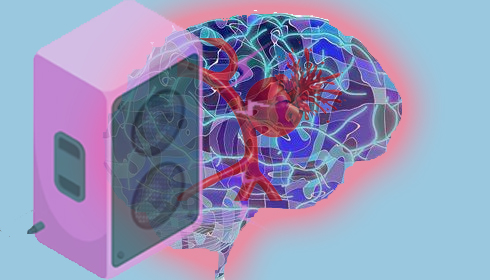
Chattisgarh man suffers brain hemorrhage due to loud DJ playing near his house amid reserach pointing out the link between the two
A recent occurrence in Surguja, Chhattisgarh, has raised awareness about the hazards of loud DJ music when a man reportedly had a brain haemorrhage. Sanjay Jaiswal, a native of Balrampur, Surguja, had acute vertigo and vomiting, which led to a diagnosis of brain haemorrhage. Local media sources reported that Jaiswal's family attributed his dizziness to exposure to loud DJ music near his home.
Dr. Shailendra Gupta, an ENT specialist at Ambikapur's Government District Hospital, diagnosed Sanjay's brain with blood clots caused by a rupture of cerebral vein. Dr. Gupta expressed concern about the case, highlighting the common links between such illnesses and hypertension, accidents, or altercations. Sanjay, on the other hand, has no previous experience with these challenges. His relatives said that the DJ's deafening music had led him to get lightheaded, resulting in his medical emergency.
According to media accounts, Dr. Gupta expressed his professional worries about high-volume music, saying, "Playing music at excessive volumes is dangerous and can induce lifelong hearing damage. We report patients who lost their hearing due to noise pollution." If the sound level exceeds 150 decibels, you lose all hearing."
This occurrence has reignited debate over noise pollution, notably its health effects. Residents of Surguja have called for increased government intervention. Local businessman SK Singh remarked, "Loud DJ music is terrible for both people and the environment. Many people are going deaf. The government must address these issues to prevent disruptions to children's education and to wildlife.
Kamlesh Soni, a yoga instructor, has advocated for stronger laws to control decibel levels at public events, including a ban on DJ music after 10 p.m.
The medical community has long been aware of the health concerns posed by noise pollution. Science Direct published a 2022 study that examined the correlation between noise pollution and cardiovascular illnesses, including strokes. The study revealed that individuals exposed to traffic noise exceeding 45 dB had a 42% increased risk of experiencing an ischemic stroke. Furthermore, studies have linked exposure to road traffic and railway noise to an increased risk of stroke, specifically hemorrhagic stroke, a condition Sanjay Jaiswal experienced.
Another German study found that exposure to aircraft noise increased the risk of stroke, even at relatively low decibel levels (less than 40 dB). The findings also revealed that noise pollution from wind turbines and road traffic could increase the likelihood and severity of strokes.
The Surguja incident, combined with rising scientific evidence, has underlined the necessity for more stringent noise pollution restrictions. The doctor told us, "Out of the 50 traffic workers we examined in 2022, 12 had trouble hearing, and 25 suffered from high blood pressure and sleep disturbances."
Surguja authorities have yet to take any decisive action, but people are calling for curbs on loud music and stricter enforcement of current noise pollution rules. This example could serve as a catalyst for stricter laws and increased public awareness of the negative effects of excessive loudness.
As the discussion over noise pollution heats up, incidences such as Sanjay Jaiswal's bleeding highlight the need for rapid action. The link between excessive noise exposure and major health problems is becoming increasingly obvious, as evidenced by research and expert opinion. Moving forward, tighter noise limits may be necessary to protect public health.